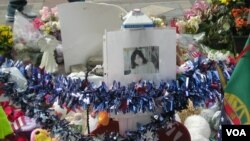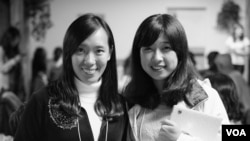Chinese student Lu Lingzi’s dreams of earning a master’s degree from Boston University and becoming a financial analyst were shattered last April when she was one of three people killed in the Boston Marathon bombings.
The 23-year-old woman from Shenyang was studying for a degree in statistics, and in her spare time liked to explore her new city.
“We really enjoyed our life in Boston and at BU,” said Jing Li, Lu’s roommate, who is also from northern China. “Lingzi, she was very hard working, and she was very good at math, and I remember that she often came to me very happily and told me that she had got a high grade on her exam.”
Both Boston University and the American Statistical Association are working to help others pursue their dreams in Lu’s memory. Recently, Boston University announced the Lu Lingzi Memorial Scholarship Fund has raised more than $1 million, and donations are still coming in.
“It’s very impressive, and it’s not finished yet, we’re still seeing that people are still touched by this, and accordingly we expect this to keep going for quite a while, especially in Asia, where this resonated deeply with folks,” said Scott Nichols, BU’s senior vice president for development and alumni relations.
The fund was created shortly after Lu’s death, when university trustees, deeply saddened by the tragedy, agreed to create a memorial scholarship. Nichols said the trustees committed $550,000 “within seconds” at an initial meeting, and that subsequent donations submitted to the university’s website have brought in another half-million dollars, much of it from Asia
.
“So we sit here six months later, there are 1,300 gifts, literally from all over the world,” said Nichols. BU alumni clubs in China, South Korea and Taiwan have held fundraisers to support the Lu scholarship. The fund will help support two scholarships for international graduate students, with preference given to applicants from China.
“One will be awarded on an annual basis, and they’re graduate programs. Master’s [degrees], usually, are two-year programs, so they’ll overlap,” said Willis Wang, Boston University’s vice president and associate provost for global programs. “So there will always be a Lu Lingzi scholarship recipient here on campus, that’s the intent.”
The effort to remember Lu extends beyond Boston University. Eric Kolaczyk, BU statistics professor, was Lu’s faculty advisor. He is helping to create an annual award to be given by the American Statistical Association along with the International Chinese Statistical Association in honor of his former student.
“I thought we really ought to have something within the statistics community to honor that aspect of her,” Kolaczyk said. He said Lu’s parents, who traveled from China to Boston to attend her memorial service, also inspired him.
“They were quite adamant about how very much she wanted to be in the U.S., and yet how very proud she was of her Chinese heritage, so we thought having the two societies together sponsoring this would also be reflective of that,” he said.
The award will be launched in 2015, and will be open to those currently enrolled in statistics master’s programs or who have recently earned a master’s in statistics. It will fund travel to the ASA’s annual Conference on Statistical Practice.
The city of Boston itself has not forgotten Lu Lingzi. When the Boston Red Sox recently won the World Series baseball championship, the team placed an ad in The Boston Globe newspaper dedicating the title to the city and the victims of the marathon bombings, naming Lu and the others who died.
Jing was very grateful for the mention of her late friend.
“When I read this, I cannot help but cry,” she said. “I’m really touched that there are so many people remembering them. Every time that I [hear about] the scholarship, I think it represents the best part of the people, and it reminds me of how the Boston people supported and loved each other during that difficult time.”
Lu and Jing met in an online chat group for prospective Boston University students. They both prepared for their TOEFL tests [English language proficiency exams] in China by listening to Voice of America’s English broadcasts.
“Lingzi liked VOA a lot,” Jing said.
Initially, both Lu and Jing had to adjust to their new surroundings when they arrived in Boston in 2012.
“Language was still a barrier at the beginning,” said Jing. “I remember that both of us often came to each other and complained that we didn’t get what the professor said in class today.”
The great distance from their families was also challenging.
“Sometimes we got really homesick, especially during the traditional festivals, but both of us were involved in fields that we truly loved,” she said.
In addition to their studies, the two friends enjoyed cooking in their apartment, shopping on Boston’s famed Newbury Street, visiting the Museum of Fine Arts and traveling to a retreat in nearby New Hampshire. According to Jing, the two women, who were both only children, became “like sisters.”
Meanwhile, the links between the Lu family and Boston continue.
Lu’s parents intend to travel to the city next year to visit their daughter’s grave. Wang, who was a pallbearer at the private funeral service, said the family chose Boston as her final resting place.
“The family decided that this was one of her huge dreams, to study here, to be in the United States, to get a graduate degree, to come to Boston and Boston University, and they decided to give her to the city of Boston,” he said.
In March, Boston University plans to host a Beijing event in honor of the Lu family. The Chinese capital’s BU alumni club has invited Lu’s parents to attend, as well as U.S. Ambassador to China Gary Locke, a graduate of the university’s law school.
Jing hopes the legacy of Lu Lingzi will inspire others.
“[Lingzi] has a lot of unfinished dreams,” she said. “She’s like a role model for the future students and will encourage them to study hard, play hard and cherish every moment in their lives, and also make every moment meaningful.”
The 23-year-old woman from Shenyang was studying for a degree in statistics, and in her spare time liked to explore her new city.
“We really enjoyed our life in Boston and at BU,” said Jing Li, Lu’s roommate, who is also from northern China. “Lingzi, she was very hard working, and she was very good at math, and I remember that she often came to me very happily and told me that she had got a high grade on her exam.”
Both Boston University and the American Statistical Association are working to help others pursue their dreams in Lu’s memory. Recently, Boston University announced the Lu Lingzi Memorial Scholarship Fund has raised more than $1 million, and donations are still coming in.
“It’s very impressive, and it’s not finished yet, we’re still seeing that people are still touched by this, and accordingly we expect this to keep going for quite a while, especially in Asia, where this resonated deeply with folks,” said Scott Nichols, BU’s senior vice president for development and alumni relations.
The fund was created shortly after Lu’s death, when university trustees, deeply saddened by the tragedy, agreed to create a memorial scholarship. Nichols said the trustees committed $550,000 “within seconds” at an initial meeting, and that subsequent donations submitted to the university’s website have brought in another half-million dollars, much of it from Asia
.
“So we sit here six months later, there are 1,300 gifts, literally from all over the world,” said Nichols. BU alumni clubs in China, South Korea and Taiwan have held fundraisers to support the Lu scholarship. The fund will help support two scholarships for international graduate students, with preference given to applicants from China.
“One will be awarded on an annual basis, and they’re graduate programs. Master’s [degrees], usually, are two-year programs, so they’ll overlap,” said Willis Wang, Boston University’s vice president and associate provost for global programs. “So there will always be a Lu Lingzi scholarship recipient here on campus, that’s the intent.”
The effort to remember Lu extends beyond Boston University. Eric Kolaczyk, BU statistics professor, was Lu’s faculty advisor. He is helping to create an annual award to be given by the American Statistical Association along with the International Chinese Statistical Association in honor of his former student.
“I thought we really ought to have something within the statistics community to honor that aspect of her,” Kolaczyk said. He said Lu’s parents, who traveled from China to Boston to attend her memorial service, also inspired him.
“They were quite adamant about how very much she wanted to be in the U.S., and yet how very proud she was of her Chinese heritage, so we thought having the two societies together sponsoring this would also be reflective of that,” he said.
The award will be launched in 2015, and will be open to those currently enrolled in statistics master’s programs or who have recently earned a master’s in statistics. It will fund travel to the ASA’s annual Conference on Statistical Practice.
The city of Boston itself has not forgotten Lu Lingzi. When the Boston Red Sox recently won the World Series baseball championship, the team placed an ad in The Boston Globe newspaper dedicating the title to the city and the victims of the marathon bombings, naming Lu and the others who died.
Jing was very grateful for the mention of her late friend.
“When I read this, I cannot help but cry,” she said. “I’m really touched that there are so many people remembering them. Every time that I [hear about] the scholarship, I think it represents the best part of the people, and it reminds me of how the Boston people supported and loved each other during that difficult time.”
Lu and Jing met in an online chat group for prospective Boston University students. They both prepared for their TOEFL tests [English language proficiency exams] in China by listening to Voice of America’s English broadcasts.
“Lingzi liked VOA a lot,” Jing said.
Initially, both Lu and Jing had to adjust to their new surroundings when they arrived in Boston in 2012.
“Language was still a barrier at the beginning,” said Jing. “I remember that both of us often came to each other and complained that we didn’t get what the professor said in class today.”
The great distance from their families was also challenging.
“Sometimes we got really homesick, especially during the traditional festivals, but both of us were involved in fields that we truly loved,” she said.
In addition to their studies, the two friends enjoyed cooking in their apartment, shopping on Boston’s famed Newbury Street, visiting the Museum of Fine Arts and traveling to a retreat in nearby New Hampshire. According to Jing, the two women, who were both only children, became “like sisters.”
Meanwhile, the links between the Lu family and Boston continue.
Lu’s parents intend to travel to the city next year to visit their daughter’s grave. Wang, who was a pallbearer at the private funeral service, said the family chose Boston as her final resting place.
“The family decided that this was one of her huge dreams, to study here, to be in the United States, to get a graduate degree, to come to Boston and Boston University, and they decided to give her to the city of Boston,” he said.
In March, Boston University plans to host a Beijing event in honor of the Lu family. The Chinese capital’s BU alumni club has invited Lu’s parents to attend, as well as U.S. Ambassador to China Gary Locke, a graduate of the university’s law school.
Jing hopes the legacy of Lu Lingzi will inspire others.
“[Lingzi] has a lot of unfinished dreams,” she said. “She’s like a role model for the future students and will encourage them to study hard, play hard and cherish every moment in their lives, and also make every moment meaningful.”





